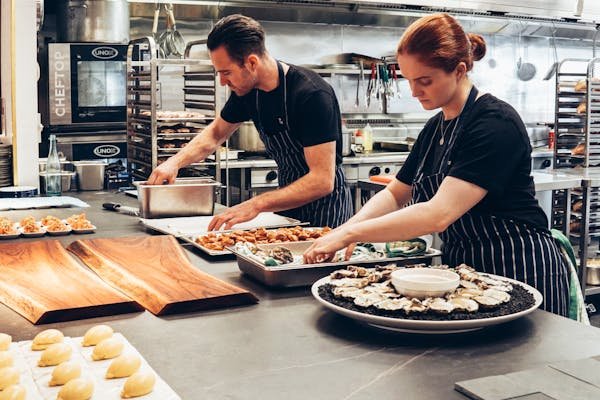Running a catering business requires more than just culinary skills; it involves effective marketing to attract and retain clients. In a competitive industry, standing out can be challenging, but with the right strategies, you can grow your business and build a strong brand. This article will explore various marketing strategies tailored specifically for catering businesses, offering practical and actionable advice to help you succeed.
Understanding Your Market
Deep Diving into Customer Personas
To truly understand your market, it’s essential to create detailed customer personas. A customer persona is a semi-fictional representation of your ideal client based on market research and real data about your existing clients. Include details such as their age, gender, occupation, income level, lifestyle, and specific catering needs.
For instance, you might have a persona for corporate clients who need regular office catering, another for brides planning their weddings, and one for families organizing private parties. These personas help you tailor your marketing messages to resonate deeply with each segment.
Using Analytics to Understand Behavior
Utilize analytics tools to gain deeper insights into your customer behavior. Google Analytics, social media insights, and customer relationship management (CRM) software can provide valuable data on how potential clients interact with your website and social media pages.
Analyze which pages they visit most, how long they stay, and what actions they take. This data can help you understand what content and offers are most appealing to your audience, allowing you to refine your strategies accordingly.
Segmenting Your Market
Market segmentation involves dividing your broad customer base into smaller, more manageable groups based on specific criteria. These criteria can include demographic information, geographic location, psychographic traits, and behavioral patterns.
For a catering business, segmentation might involve targeting corporate clients with a specific set of services, while offering different packages to wedding planners or event organizers. By segmenting your market, you can create more personalized marketing campaigns that speak directly to the needs and preferences of each group.
Tailoring Your Offerings
Once you have a clear understanding of your market segments, tailor your offerings to meet their specific needs. For corporate clients, offer convenient, healthy lunch options with delivery services. For weddings, provide customizable menu options and comprehensive catering packages that include decorations and service staff.
For private parties, highlight unique, themed menus that can make any event special. By customizing your services to match the needs of different segments, you can attract a wider range of clients and increase customer satisfaction.
Conducting Competitor Analysis
Competitor analysis goes beyond simply knowing who your competitors are. Conduct a SWOT analysis (Strengths, Weaknesses, Opportunities, Threats) for each major competitor. Identify their key strengths and see how you can differentiate yourself by offering something unique or superior.
Look for their weaknesses and find opportunities to capitalize on them. Pay attention to their customer reviews to understand what clients like and dislike about their services. This detailed analysis can provide strategic insights that help you refine your offerings and marketing strategies.
Leveraging Local Market Trends
Staying updated with local market trends is crucial for any catering business. Attend local food and industry events, participate in trade shows, and engage with local business groups to stay in the loop. Use these opportunities to network with potential clients and partners.
Additionally, keep an eye on local news and publications to understand current trends and consumer preferences in your area. Adapt your menu and marketing strategies to align with these trends, ensuring your offerings remain relevant and attractive.
Engaging with Your Community
Engagement with your local community can provide invaluable insights into your market. Participate in local events, sponsor community activities, and collaborate with other local businesses. Host tasting events, cooking classes, or open houses to attract potential clients and gather feedback.
Building a strong community presence not only enhances your brand visibility but also helps you better understand the needs and preferences of your local market. Use this engagement to gather data, refine your services, and strengthen your relationship with the community.
Utilizing Surveys and Feedback
Surveys and feedback are direct ways to gather insights from your clients. After catering an event, ask for detailed feedback on your services, including what they liked and what could be improved. Conduct regular surveys to understand your audience’s preferences, expectations, and pain points.
Offer incentives like discounts on future services for completing surveys. Analyze this feedback to identify patterns and trends that can inform your marketing and operational strategies. Continuous improvement based on client feedback can enhance customer satisfaction and loyalty.
Exploring Niche Markets
Identifying and exploring niche markets can help differentiate your catering business. Consider catering to specific dietary preferences such as vegan, gluten-free, or organic menus. You might also explore niche events like themed parties, corporate wellness programs, or educational workshops.
By targeting niche markets, you can position your business as a specialized provider and attract clients looking for specific catering solutions. This strategic focus can help you build a strong reputation within these niches and drive business growth.
Building Your Brand

Establishing a Strong Brand Identity
A strong brand identity is the foundation of your marketing efforts. It goes beyond just having a logo and a name. Your brand identity encompasses your values, mission, vision, and the overall experience you provide to your customers.
Define what your catering business stands for and how you want to be perceived by your target audience. Whether it’s luxury, affordability, sustainability, or innovation, ensure that every aspect of your business reflects these core values consistently.
Crafting a Memorable Brand Story
Your brand story is a powerful tool to connect emotionally with your audience. Share the journey of how your catering business started, the challenges you overcame, and the milestones you achieved. Highlight the passion and dedication behind your culinary creations.
A compelling brand story can make your business more relatable and memorable, helping you stand out in a crowded market. Use your brand story across your website, social media, and marketing materials to create a cohesive and engaging narrative.
Developing a Consistent Brand Voice
A consistent brand voice helps in building a recognizable and trustworthy brand. Decide on the tone and style of your communication. Whether it’s professional, friendly, humorous, or sophisticated, maintain this voice across all platforms.
Consistency in messaging reinforces your brand identity and helps in establishing a strong connection with your audience. Your brand voice should reflect your business values and resonate with your target audience.
Utilizing Professional Photography and Videography
High-quality visuals are crucial for a catering business. Invest in professional photography and videography to showcase your dishes, events, and behind-the-scenes moments. Stunning visuals can make your marketing materials more appealing and shareable.
Use these images and videos on your website, social media, and promotional campaigns. Visual content can convey the quality and creativity of your offerings, attracting potential clients and enhancing your brand image.
Creating a Unique Logo and Tagline
Your logo and tagline are essential elements of your brand identity. They should be unique, memorable, and reflective of your brand values. Work with a professional designer to create a logo that stands out and represents your business effectively.
Your tagline should be short, catchy, and convey the essence of your brand. Together, your logo and tagline should leave a lasting impression and help clients remember your business.
Enhancing Customer Experience
Your brand is not just about visual identity; it’s also about the experience you provide. From the first point of contact to the final delivery, ensure that every interaction with your business is positive and memorable.
Train your staff to provide exceptional customer service, be responsive to inquiries, and go the extra mile to meet client needs. Personalize your services to create unique experiences for each client. A consistent and delightful customer experience strengthens your brand and encourages repeat business and referrals.
Leveraging Brand Ambassadors
Brand ambassadors can help amplify your brand message and reach a wider audience. Identify satisfied clients, influential personalities, or social media influencers who align with your brand values. Encourage them to share their positive experiences with your catering services on their platforms.
Provide them with exclusive offers, branded merchandise, or personalized services as incentives. Brand ambassadors can build credibility and trust, driving more clients to your business through word-of-mouth recommendations.
Building a Strong Online Presence
In the digital age, a strong online presence is crucial for brand building. Optimize your website for search engines to increase visibility and attract organic traffic. Use social media platforms strategically to engage with your audience and share your brand story.
Create valuable content, such as blog posts, videos, and infographics, that reflects your expertise and enhances your brand authority. Engage with your audience regularly by responding to comments, messages, and reviews. A robust online presence can help you reach a larger audience and build a loyal community around your brand.
Participating in Industry Events and Awards
Participating in industry events and awards can enhance your brand’s credibility and visibility. Attend food festivals, trade shows, and culinary competitions to showcase your services and network with potential clients and partners.
Apply for industry awards and recognitions to gain public acknowledgment of your excellence. Winning awards can boost your reputation and provide valuable marketing opportunities. Highlight your participation and achievements on your website and social media to build trust and attract new clients.
Creating Branded Merchandise
Branded merchandise can serve as a tangible reminder of your business and create additional marketing opportunities. Offer branded items such as aprons, cooking utensils, or eco-friendly bags to your clients and event attendees.
These items can serve as conversation starters and spread awareness of your brand. Ensure that your merchandise is of high quality and reflects your brand values. Branded merchandise can enhance client loyalty and keep your business top-of-mind.
Monitoring and Evolving Your Brand
Brand building is an ongoing process. Regularly monitor your brand’s performance and gather feedback from clients and stakeholders. Use this feedback to identify areas for improvement and adapt your strategies accordingly.
Stay updated with industry trends and innovations to keep your brand relevant and competitive. Continuously evolve your brand to meet changing market demands and client expectations. By being proactive and adaptive, you can maintain a strong and dynamic brand that stands the test of time.
Leveraging Social Media
Developing a Content Strategy
A well-thought-out content strategy is essential for effective social media marketing. Start by identifying your key objectives, whether it’s increasing brand awareness, driving traffic to your website, or generating leads. Your content strategy should align with these goals and cater to your audience’s interests and needs.
Plan your content in advance, ensuring a mix of promotional posts, educational content, client testimonials, and engaging visuals. Use a content calendar to schedule your posts consistently, keeping your audience engaged and informed.
Engaging with Your Audience in Real-Time
Real-time engagement can significantly boost your social media presence. Monitor your social media channels regularly and respond promptly to comments, messages, and mentions. Engage in conversations, answer questions, and acknowledge feedback.
Real-time interaction shows that you value your audience and are dedicated to providing excellent customer service. Use live features on platforms like Facebook and Instagram to host Q&A sessions, cooking demonstrations, or live events. These real-time interactions can create a more personal connection with your audience and build loyalty.
Utilizing User-Generated Content
User-generated content (UGC) is a powerful tool for building trust and authenticity. Encourage your clients to share their experiences with your catering services on social media. Create a unique hashtag for your brand and ask clients to use it when posting their photos and reviews.
Repost this content on your own social media channels, giving credit to the original creators. UGC serves as social proof, showing potential clients that others have had positive experiences with your business. It also fosters a sense of community and engagement around your brand.
Running Social Media Contests and Giveaways
Contests and giveaways can generate excitement and increase engagement on your social media platforms. Design contests that encourage user participation, such as photo contests, recipe submissions, or creative caption challenges. Offer attractive prizes like free catering services, exclusive discounts, or branded merchandise.
Promote your contests across all your social media channels and use paid ads to reach a wider audience. Ensure that the contest rules are clear and easy to follow. Contests and giveaways can boost your visibility, attract new followers, and create a buzz around your brand.

Collaborating with Influencers
Collaborating with influencers can expand your reach and enhance your credibility. Identify influencers who align with your brand values and have a significant following in your target market. Reach out to them with a personalized pitch, highlighting how a partnership can be mutually beneficial.
Collaborations can take various forms, such as sponsored posts, event partnerships, or social media takeovers. Influencers can create authentic content that showcases your services and reaches a broader audience. Track the performance of these collaborations to measure their impact and refine your strategy.
Creating Engaging Stories and Reels
Stories and reels on platforms like Instagram and Facebook are excellent for sharing short, engaging content. Use these features to provide behind-the-scenes glimpses of your catering operations, showcase new menu items, or highlight special events.
Stories and reels can also be used for quick tips, client testimonials, or promotional announcements. Their ephemeral nature encourages viewers to engage promptly, creating a sense of urgency. Use interactive features like polls, questions, and countdowns to enhance engagement and gather insights from your audience.
Utilizing Paid Social Media Advertising
Paid social media advertising can help you reach a larger audience and achieve your marketing goals faster. Use the advanced targeting options available on platforms like Facebook, Instagram, and LinkedIn to reach specific demographics, interests, and behaviors. Create compelling ad copy and visuals that resonate with your target audience.
Test different ad formats, such as carousel ads, video ads, and sponsored posts, to see what works best. Monitor your ad performance regularly and adjust your strategy based on the results. Paid advertising can drive traffic, generate leads, and increase brand awareness effectively.
Measuring and Analyzing Performance
Measuring and analyzing your social media performance is crucial for refining your strategy. Use analytics tools provided by social media platforms to track key metrics such as engagement rates, reach, impressions, and conversion rates. Identify which types of content perform best and which times of day yield the highest engagement.
Analyze your audience demographics to ensure your content is reaching the right people. Use these insights to optimize your content strategy, improve your targeting, and achieve better results. Regularly review and adjust your social media strategy based on your performance data.
Leveraging Social Media for Customer Service
Social media is not just a marketing tool; it can also enhance your customer service. Use your social media channels to address customer inquiries, resolve issues, and gather feedback. Create a dedicated customer service team to monitor your social media accounts and respond promptly to messages and comments.
Publicly addressing customer concerns shows transparency and commitment to customer satisfaction. Use positive feedback and testimonials to highlight your excellent service. Social media customer service can improve client relationships and enhance your brand reputation.
Staying Updated with Social Media Trends
Social media trends are constantly evolving, and staying updated is essential for maintaining an effective strategy. Follow industry blogs, join social media groups, and participate in webinars to stay informed about the latest trends and best practices.
Experiment with new features and formats, such as live streaming, augmented reality filters, or shoppable posts, to keep your content fresh and engaging. Adapt your strategy based on emerging trends and audience preferences. Staying ahead of the curve can give you a competitive edge and keep your audience engaged.
Utilizing Email Marketing
Building a High-Quality Email List
Building a high-quality email list is the foundation of a successful email marketing strategy. Focus on organic growth by encouraging sign-ups through various channels. Use your website, social media, and in-person events to gather email addresses.
Offer valuable incentives, such as exclusive recipes, discounts, or free consultations, to entice potential clients to subscribe. Ensure that your sign-up forms are easy to find and fill out. Avoid purchasing email lists, as they often contain uninterested recipients and can harm your email deliverability and brand reputation.
Segmenting Your Email List
Segmenting your email list allows you to send more targeted and relevant messages to your subscribers. Divide your list into different segments based on criteria such as demographics, past purchases, event attendance, or engagement levels.
For instance, create segments for corporate clients, wedding planners, and private party organizers. Tailor your email content to address the specific needs and interests of each segment. Segmentation can improve open rates, click-through rates, and overall engagement by providing personalized content that resonates with your audience.
Designing Engaging Email Campaigns
The design of your email campaigns plays a crucial role in capturing your audience’s attention and driving action. Use a clean and professional layout that reflects your brand identity. Incorporate high-quality images of your dishes and events to make your emails visually appealing.
Ensure that your emails are mobile-friendly, as many recipients will view them on their phones. Use compelling subject lines and preview text to entice recipients to open your emails. Include clear calls-to-action (CTAs) that guide readers towards booking your services, visiting your website, or engaging with your social media channels.
Crafting Personalized Content
Personalization goes beyond using the recipient’s name in the email. Use data from your email list segmentation to create content that speaks directly to the interests and needs of each subscriber. For example, send tailored menu suggestions to wedding planners based on popular trends, or offer corporate clients seasonal catering packages.
Use dynamic content to customize sections of your email based on the recipient’s preferences or past interactions. Personalized emails can significantly increase engagement and conversion rates by making your audience feel valued and understood.
Automating Your Email Marketing
Email automation can streamline your marketing efforts and ensure timely communication with your audience. Set up automated workflows for different stages of the customer journey. For new subscribers, create a welcome series that introduces your business and highlights your key services.
For existing clients, set up automated follow-up emails after events to gather feedback and encourage repeat business. Use automation for seasonal promotions, event reminders, and re-engagement campaigns for inactive subscribers. Automation saves time and ensures that your audience receives relevant messages at the right time.
Analyzing Email Performance
Regularly analyzing your email performance is essential for refining your strategy and improving results. Use email marketing software to track key metrics such as open rates, click-through rates, conversion rates, and unsubscribe rates.
Identify which types of content, subject lines, and CTAs perform best. A/B test different elements of your emails, such as visuals, copy, and sending times, to determine what resonates most with your audience. Use these insights to optimize your email campaigns, increase engagement, and drive more bookings for your catering services.
Integrating Email with Other Marketing Channels
Integrating email marketing with your other marketing channels can amplify your reach and impact. Promote your email sign-up through your social media profiles, website, and in-person events. Use email to drive traffic to your blog, social media pages, and special promotions.
Create cohesive campaigns that leverage multiple channels to reinforce your message and increase visibility. For instance, run a social media contest and promote it through email, or announce a new blog post in your newsletter. Integrated marketing efforts create a seamless experience for your audience and maximize your marketing effectiveness.
Nurturing Client Relationships
Email marketing is a powerful tool for nurturing client relationships and building loyalty. Use email to stay in touch with past clients, providing them with valuable content and exclusive offers. Send personalized thank-you notes after events, and follow up with satisfaction surveys to gather feedback and show appreciation.
Keep your audience informed about new menu items, seasonal offerings, and upcoming events. By maintaining regular and meaningful communication, you can foster long-term relationships with your clients and encourage repeat business and referrals.
Ensuring Compliance with Email Regulations
Adhering to email marketing regulations is crucial for maintaining trust and avoiding legal issues. Ensure that your email practices comply with regulations such as the CAN-SPAM Act in the United States and the General Data Protection Regulation (GDPR) in Europe.
Obtain explicit consent from subscribers before adding them to your email list. Provide clear opt-out options in every email, and honor unsubscribe requests promptly. Include your business’s physical address and contact information in your emails. Compliance not only protects your business but also builds credibility and trust with your audience.
Leveraging Customer Testimonials and Case Studies

Including customer testimonials and case studies in your emails can build credibility and encourage conversions. Highlight positive feedback and success stories from satisfied clients, showcasing the quality and impact of your catering services.
Use detailed case studies to illustrate how you successfully catered significant events, solved specific challenges, and exceeded client expectations. Testimonials and case studies serve as social proof, reassuring potential clients of your expertise and reliability.
Conclusion
Effective marketing is essential for the growth and success of your catering business. By understanding your market, building a strong brand, leveraging social media, and utilizing email marketing, you can create a comprehensive strategy that attracts and retains clients. These strategies provide a roadmap for startup founders to navigate the competitive catering industry and build a sustainable business.
Remember that consistency, personalization, and engagement are key to successful marketing. Continuously analyze your performance, gather feedback, and adapt your strategies to meet the evolving needs of your clients. By staying proactive and innovative, you can differentiate your catering business and create lasting connections with your audience.
Read Next:
- The Intersection of Marketing and Statistics: Trends for 2024
- Marketing Strategies to Grow Your Orthodontic Practice
- Hot Marketing Ideas to Heat Up Your Summer Sales
- Essential Marketing Materials for Your Business
- Local Marketing Strategies to Boost Restaurant Traffic






















Comments are closed.